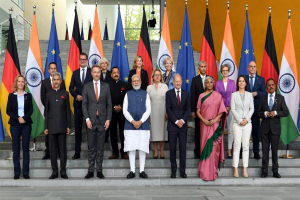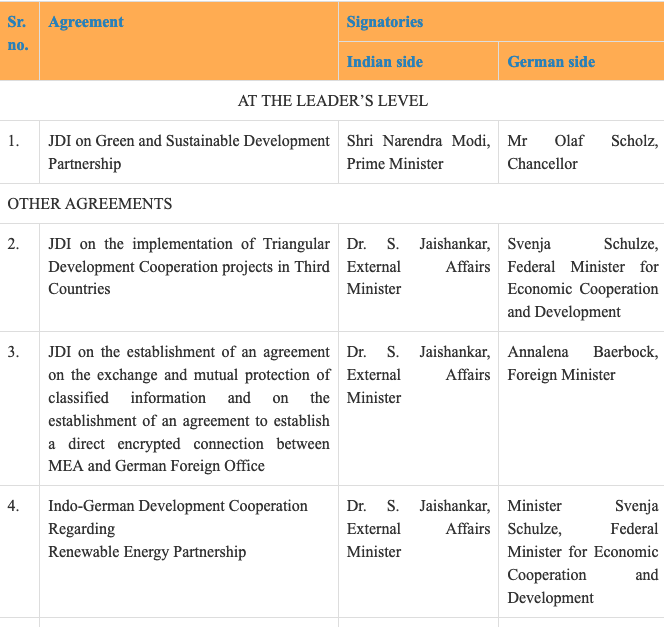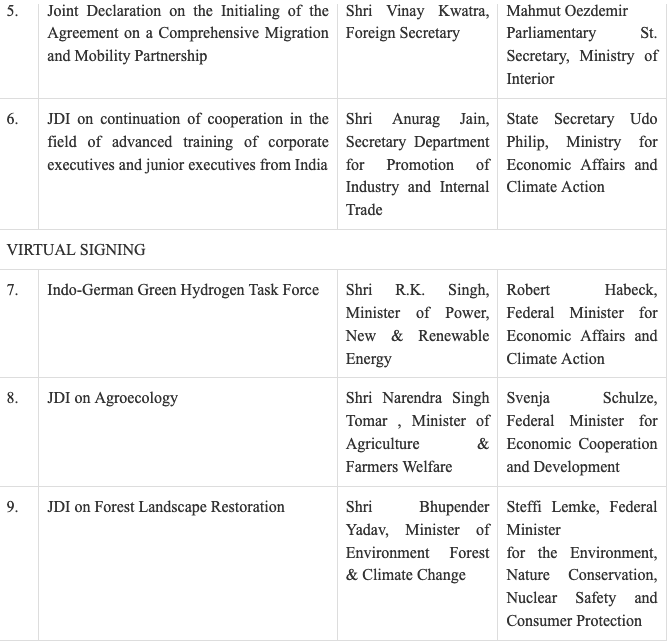
Berlin: India and Germany today underlined their “firm commitment” to the objective of holding the increase in the global average temperature to well below 2°C above pre-industrial levels, according to a joint statement released following the 6th German-Indian Inter-Governmental Consultations, here today.
Both countries also emphasized pursuing efforts to limit the temperature increase to 1.5°C above pre-industrial levels and bolstering a just transition towards renewable energies.
The German and Indian governments, under the co-chairmanship of the Federal Chancellor Olaf Scholz and Prime Minister Narendra Modi, held the sixth round of Inter-Governmental Consultations, also attended by ministers and other high representatives from both countries. Finance Minister Nirmala Sitharaman; External Affairs Minister Dr S Jaishankar; MoS (IC) for Science &Technology and Earth Sciences Dr Jitendra Singh; and Secretary DPIIT Anurag Jain, made presentations from the Indian side.
The last IGC was held in 2019.
Both Modi and Scholz highlighted their commitment to economic recovery from the Covid-19 pandemic that safeguards the planet and limits temperature increase. They stressed that the economic recovery should further build a more resilient, environmentally sustainable, climate-friendly and inclusive future for all in line with the 2030 Agenda for Sustainable Development and the national commitments by both countries under the Paris Agreement.
The Plenary session concluded with the signing by Prime Minister and Chancellor Scholz of the Joint Declaration of Intent (JDI) establishing the Green and Sustainable Development Partnership. This Partnership envisages a whole-of-government approach to India-Germany cooperation on Sustainable Development Goals (SDGs) and climate action, under which Germany has agreed to make an advance commitment of 10 billion Euros of new and additional development assistance until 2030. This JDI will also create a Ministerial mechanism within the framework of the IGC to provide high-level coordination and political direction to the Partnership.
List of agreements signed on the occasion of 6th India-Germany Inter-Governmental Consultations


“Firmly convinced” of the importance of a rules-based international order with the United Nations at its core and respect for international law, Germany and India underlined the importance of effective and reformed multilateralism.
Besides, as long-standing members of the “Group of Four”, the two Governments expressed their commitment to intensify their efforts to spur “an overdue” reform of the UN Security Council “in order to make it “reflective of contemporary realities”. Germany reiterated its steadfast support for India’s early entry into the Nuclear Suppliers Group.
Germany reiterated its strong condemnation of the “unlawful and unprovoked” aggression against Ukraine by Russian Forces. Germany and India expressed their serious concern about the ongoing humanitarian crisis in Ukraine. They unequivocally condemned civilian deaths in Ukraine. They reiterated the need for an immediate cessation of hostilities. Modi, in his speech, said “From the very beginning of the Ukrainian crisis, we called for an immediate cease-fire, insisting that dialogue is the only way to resolve the dispute.” He expressed concerns over Skyrocketing oil prices due to the turmoil triggered by the Ukraine conflict; and also the shortage of food grains and fertilizers in the world.
On Afghanistan, both sides expressed their serious concern about the humanitarian situation, the resurgence of violence, including targeted terrorist attacks, the systemic violations of human rights and fundamental freedoms, and the hampered access of girls and women to education.
Later, Modi co-chaired a Business Round Table with Chancellor Scholz. In his remarks, the Prime Minister emphasised the broad-based reforms carried out by the Government and highlighted the growing numbers of start-ups and unicorns in India. He invited the business leaders to invest in India’s youth.
The event saw the participation of high representatives from the Governments and selected CEOs from both sides, who engaged in discussions on topics ranging from climate cooperation; Supply chains; Research and Development.
Prior to the sixth round of Biennial Inter-Governmental Consultations (IGC) between India and Germany, Prime Minister Modi also held a bilateral meeting today with Chancellor Scholz. Discussions covered key areas of bilateral cooperation under the overall strategic partnership, as well as regional and global developments.
Prime Minister was accorded a ceremonial guard of honour and received by Chancellor Scholz at the Federal Chancellery. The two leaders thereafter met in a one-on-one format followed by delegation-level talks.
Photo caption: PM Narendra Modi and the Chancellor of Germany, Mr. Olaf Scholz in a group photograph, during the Plenary Meeting of the Inter-Governmental Consultations, in Berlin, Germany.





